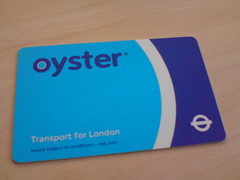
The Independent has a rundown of some of the pros and cons of using contactless payment technology.
Whilst consumers might worry about the security of these cards (easily nickable), the hope is that they will be a more convenient means of paying quickly for small items. And also, if they do get stolen, it’s potentially going to take ages for the robber to spend the money on it, that’s if there’s much on there in the first place. But the technology comes at a price, with the card provider taking a small cut of each transaction, which will inevitably be paid for by the consumer.
Retailers using them will be looking to increase their revenues through more efficient transactions but of course, with potentially less staff.
The banks, naturally, love this technology:
Contactless technology is undoubtedly the future of payments. It simply makes life easier: it’s secure, convenient and a practical alternative to cash. We know anything new and unknown can be daunting but fears about contactless security are unfounded. As a bank, the security of money is our number one priority so if we believed there was any increased security threat with contactless cards we simply wouldn’t be introducing them. The card cannot be swiped accidentally, doesn’t expose personal information and will ensure the PIN is entered periodically, as well as all the normal debit and credit card protection. Countries including the USA and Canada have had contactless for a while and have seen no notable increase in fraud as a result. We are at the early adopter stage but the possibilities with contactless technology are endless – there are already plans to introduce mobile phones with contactless functionality. Payment technology is definitely coming out of our wallets and contactless cards are the first step towards that. (Brian Cunnington, Barclays)
The article finishes with what feels like a contradictory statement from a consumer affairs correspondent:
there’s the question of whether it’s harder to keep a track of your money if you’re not handing it over in hard currency or acknowledging its expenditure with a pin code. More abstractly, I quite like the vanishing quality of cash and wonder whether allowing the archiving of every last jot of personal spending gives too much information to commercial enterprises.
I feel it will be easier to track your spending using contactless cards (as well as debit/credit cards), but as we’ve said before, there may be somethings that you don’t want tracked, and therefore cash will always have its uses. And companies already have masses of data about your spending, so these small transactions probably won’t make a massive difference.
But that’s my view – how do you feel about companies having access to this sort of data, or contactless payment cards in general? Let us know in the comments below.
![]() photo credit: kalleboo
photo credit: kalleboo